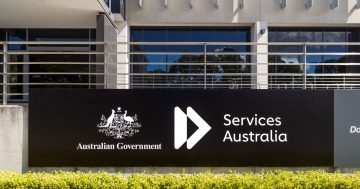
Special Minister of State Chris Steel has delivered his annual update on progress to reform the ACT’s procurement processes. Photo: Michelle Kroll.
The ACT Government is slogging through a range of reforms which aims to improve the Territory’s procurement processes in the wake of several damning reports.
Seven ACT Auditor General reports have been made into various procurement processes in the past five years, with two projects – CIT contracts and the Campbell Primary School upgrade tender process – now being investigated by the ACT Integrity Commission.
The next project under scrutiny is procurement of reuseable facility services at the Mugga Lane Resource Management Centre and the Mitchell Resource Management Centre. The ACT Audit Office is focussing on how the Transport Canberra and City Services Directorate planned for and conducted the procurement. (This audit is expected to be completed in the second half of this year).
The wording of the Government Procurement Board has also previously been raised as an issue, with the government already agreeing it needs to tighten its procurement decision reviewing system.
Special Minister of State Chris Steel updated the Legislative Assembly that work was progressing to strengthen procurement frameworks including establishing a Goods and Services Accreditation Program.
He said this would ensure Territory entities had the “capability and capacity” to undertake procurements and establish an evaluation process to determine the right levels of accreditation.
“The program is supported by the Tiered Services Delivery Model which is aligned with the scale, scope, and risk of the procurement to ensure that high-risk and high-value procurements are provided with strengthened and targeted fit-for-purpose supports,” he said.
The Government Procurement Board will be the body to consider and determine the appropriate levels of accreditation, reviewing all applications with those bodies which need to be accredited by 1 July.
Given the ACT spends close to $1.5 billion on procurements each year, Mr Steel said it was important to make sure processes were more transparent, easier for business and better supported.
Another aspect of the reform program requires a project to essentially “map” procurement processes along with providing support.
A pilot for a Tired Services Model to identify roles, responsibilities and milestone points in procurement processes has been completed and the final version is expected to launch alongside the new accreditation process.
This also aligns with the start of the Government Procurement Amendment Act 2024 on 1 July.
Procurement ACT is also working on creating two new advisory and support services. Work is ongoing for a contracting service while dedicated probity advisory services started this year (offered through the ACT Government Solicitor).
Mr Steel said these would help Territory entities identify and manage probity risks in each stage of procurement.
“The services also support the procurement of external probity advisory and auditing services, where appropriate, based on the probity risks,” he said.
“The provision of accurate, timely, practical and customer-focussed services throughout the procurement lifecycle supports evidence-based procurement decisions which are conducted with probity and can withstand scrutiny.”
The Government Procurement Amendment Act 2024 was passed earlier this year which will help the government adopt recommendations from a range of auditor-general reports about procurement processes.
Mr Steel said this was about making procurement legislation contemporary, fit for purpose, and ensuring the “pursuit of value for money” was enshrined in Canberra’s laws.
“The Amendment Act strengthens this concept by ensuring that value for money is the best outcome that maximises the overall benefit to the Territory,” he said.
The government procurement rules and the procurement board’s terms of reference are expected to be finalised and presented to the Legislative Assembly in coming months.
The entire reform program is slated to be delivered in 2025.




















